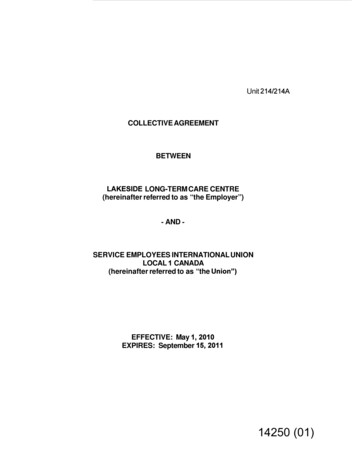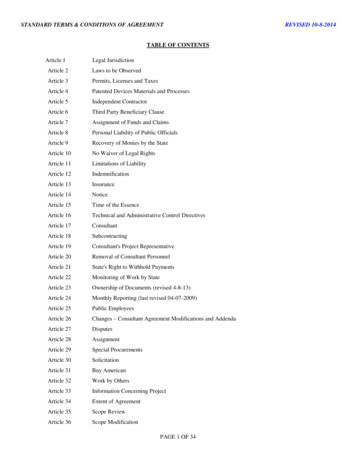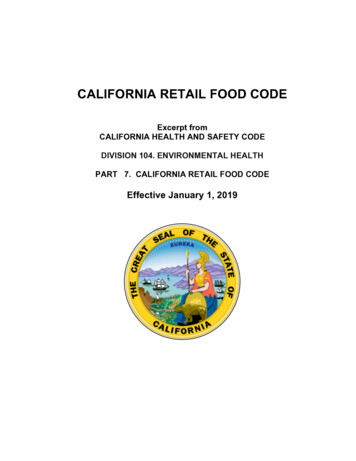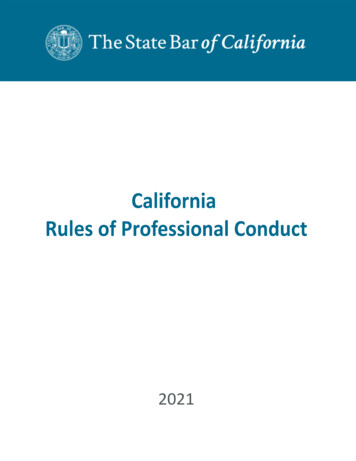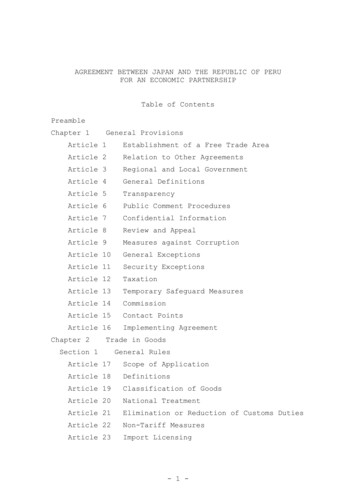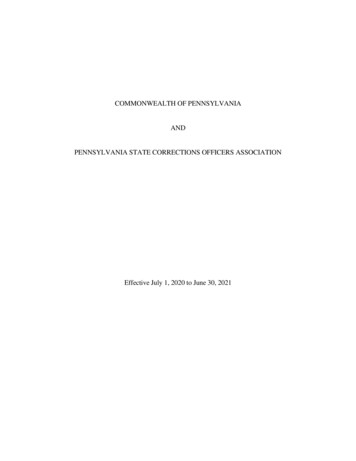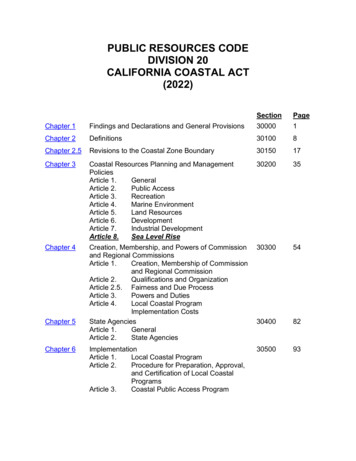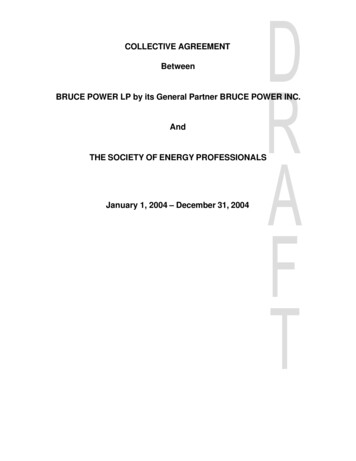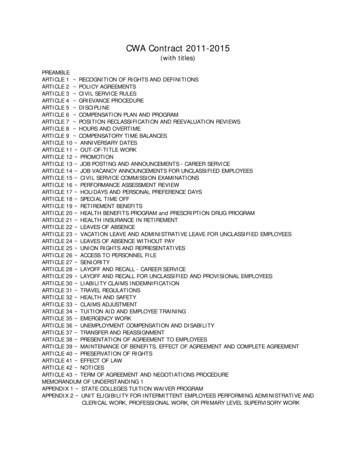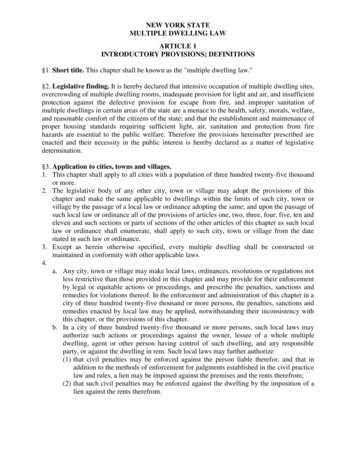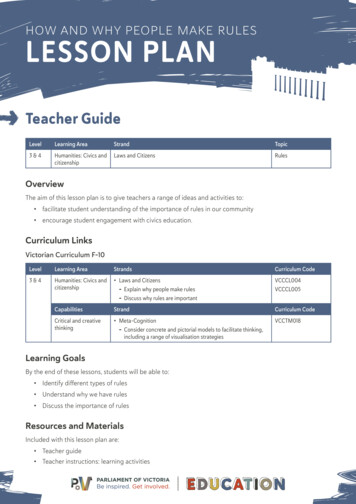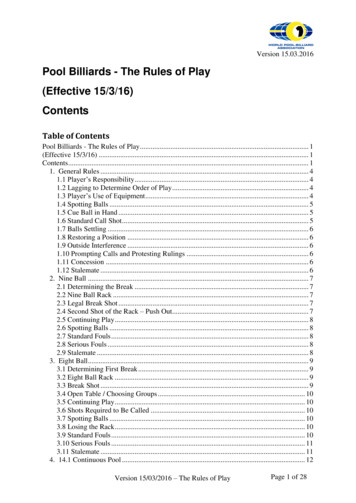
Transcription
ARTICLE V. RULES OF PROFESSIONAL CONDUCTPREAMBLE AND SCOPEPREAMBLE: A LAWYER'S RESPONSIBILITIES[1] A lawyer, as a member of the legal profession, is a representative of clients, an officer ofthe legal system and a public citizen having special responsibility for the quality of justice.[2] As a representative of clients, a lawyer performs various functions. As advisor, a lawyerprovides a client with an informed understanding of the client's legal rights and obligations andexplains their practical implications. As advocate, a lawyer zealously asserts the client's positionunder the rules of the adversary system. As negotiator, a lawyer seeks a result advantageous tothe client but consistent with requirements of honest dealings with others. As an evaluator, alawyer acts by examining a client's legal affairs and reporting about them to the client or toothers.[3] In addition to these representational functions, a lawyer may serve as a third-partyneutral, a nonrepresentational role helping the parties to resolve a dispute or other matter.Some of these Rules apply directly to lawyers who are or have served as third-party neutrals.See, e.g., Rules 1.12 and 2.4. In addition, there are Rules that apply to lawyers who are notactive in the practice of law or to practicing lawyers even when they are acting in anonprofessional capacity. For example, a lawyer who commits fraud in the conduct of abusiness is subject to discipline for engaging in conduct involving dishonesty, fraud, deceit ormisrepresentation. See Rule 8.4.[4] In all professional functions a lawyer should be competent, prompt and diligent. A lawyershould maintain communication with a client concerning the representation. A lawyer shouldkeep in confidence information relating to representation of a client except so far as disclosureis required or permitted by the Rules of Professional Conduct or other law.[5] A lawyer's conduct should conform to the requirements of the law, both in professionalservice to clients and in the lawyer's business and personal affairs. A lawyer should use thelaw's procedures only for legitimate purposes and not to harass or intimidate others. A lawyershould demonstrate respect for the legal system and for those who serve it, including judges,other lawyers and public officials. While it is a lawyer's duty, when necessary, to challenge therectitude of official action, it is also a lawyer's duty to uphold legal process.[6] As a public citizen, a lawyer should seek improvement of the law, access to the legalsystem, the administration of justice and the quality of service rendered by the legal profession.As a member of a learned profession, a lawyer should cultivate knowledge of the law beyond itsuse for clients, employ that knowledge in reform of the law and work to strengthen legaleducation. In addition, a lawyer should further the public's understanding of and confidence inthe rule of law and the justice system because legal institutions in a constitutional democracydepend on popular participation and support to maintain their authority. A lawyer should bemindful of deficiencies in the administration of justice and of the fact that the poor, andsometimes persons who are not poor, cannot afford adequate legal assistance. Therefore, alllawyers should devote professional time and resources and use civic influence to ensure equalRevised June 2017
access to our system of justice for all those who because of economic or social barriers cannotafford or secure adequate legal counsel. A lawyer should aid the legal profession in pursuingthese objectives and should help the bar regulate itself in the public interest.[7] Many of a lawyer's professional responsibilities are prescribed in the Rules ofProfessional Conduct, as well as substantive and procedural law. However, a lawyer is alsoguided by personal conscience and the approbation of professional peers. A lawyer shouldstrive to attain the highest level of skill, to improve the law and the legal profession and toexemplify the legal profession's ideals of public service.[8] A lawyer's responsibilities as a representative of clients, an officer of the legal system anda public citizen are usually harmonious. Thus, when an opposing party is well represented, alawyer can be a zealous advocate on behalf of a client and at the same time assume that justiceis being done. So also, a lawyer can be sure that preserving client confidences ordinarily servesthe public interest because people are more likely to seek legal advice, and thereby heed theirlegal obligations, when they know their communications will be private.[9] In the nature of law practice, however, conflicting responsibilities are encountered.Virtually all difficult ethical problems arise from conflict between a lawyer's responsibilities toclients, to the legal system and to the lawyer's own interest in remaining an ethical person whileearning a satisfactory living. The Rules of Professional Conduct often prescribe terms forresolving such conflicts. Within the framework of these Rules, however, many difficult issues ofprofessional discretion can arise. Such issues must be resolved through the exercise ofsensitive professional and moral judgment guided by the basic principles underlying the Rules.These principles include the lawyer's obligation zealously to protect and pursue a client'slegitimate interests, within the bounds of the law, while maintaining a professional, courteousand civil attitude toward all persons involved in the legal system.[10] The legal profession is largely self-governing. Although other professions also havebeen granted powers of self-government, the legal profession is unique in this respect becauseof the close relationship between the profession and the processes of government and lawenforcement. This connection is manifested in the fact that ultimate authority over the legalprofession is vested largely in the courts.[11] To the extent that lawyers meet the obligations of their professional calling, the occasionfor government regulation is obviated. Self-regulation also helps maintain the legal profession'sindependence from government domination. An independent legal profession is an importantforce in preserving government under law, for abuse of legal authority is more readilychallenged by a profession whose members are not dependent on government for the right topractice.[12] The legal profession's relative autonomy carries with it special responsibilities of selfgovernment. The profession has a responsibility to assure that its regulations are conceived inthe public interest and not in furtherance of parochial or self-interested concerns of the bar.Every lawyer is responsible for observance of the Rules of Professional Conduct. A lawyershould also aid in securing their observance by other lawyers. Neglect of these responsibilitiescompromises the independence of the profession and the public interest which it serves.Revised June 2017
[13] Lawyers play a vital role in the preservation of society. The fulfillment of this rolerequires an understanding by lawyers of their relationship to our legal system. The Rules ofProfessional Conduct, when properly applied, serve to define that relationship.SCOPE[14] The Rules of Professional Conduct are rules of reason. They should be interpreted withreference to the purposes of legal representation and of the law itself. Some of the Rules areimperatives; cast in the terms "shall" or "shall not." These define proper conduct for purposes ofprofessional discipline. Others, generally cast in the term "may," are permissive and defineareas under the Rules in which the lawyer has discretion to exercise professional judgment. Nodisciplinary action should be taken when the lawyer chooses not to act or acts within the boundsof such discretion. Other Rules define the nature of relationships between the lawyer andothers. The Rules are thus partly obligatory and disciplinary and partly constitutive anddescriptive in that they define a lawyer's professional role. Many of the Comments use the term"should." Comments do not add obligations to the Rules but provide guidance for practicing incompliance with the Rules.[15] The Rules presuppose a larger legal context shaping the lawyer's role. That contextincludes court rules and statutes relating to matters of licensure, laws defining specificobligations of lawyers and substantive and procedural law in general. The Comments aresometimes used to alert lawyers to their responsibilities under such other law.[16] Compliance with the Rules, as with all law in an open society, depends primarily uponunderstanding and voluntary compliance, secondarily upon reinforcement by peer and publicopinion and finally, when necessary, upon enforcement through disciplinary proceedings. TheRules do not, however, exhaust the moral and ethical considerations that should inform alawyer, for no worthwhile human activity can be completely defined by legal rules. The Rulessimply provide a framework for the ethical practice of law.[17] Furthermore, for purposes of determining the lawyer's authority and responsibility,principles of substantive law external to these Rules determine whether a client-lawyerrelationship exists. Most of the duties flowing from the client-lawyer relationship attach only afterthe client has requested the lawyer to render legal services and the lawyer has agreed to do so.But there are some duties, such as that of confidentiality under Rule 1.6, that attach when thelawyer agrees to consider whether a client-lawyer relationship shall be established. See Rule1.18. Whether a client-lawyer relationship exists for any specific purpose can depend on thecircumstances and may be a question of fact.[18] Under various legal provisions, including constitutional, statutory and common law, theresponsibilities of government lawyers may include authority concerning legal matters thatordinarily reposes in the client in private client-lawyer relationships. For example, a lawyer for agovernment agency may have authority on behalf of the government to decide upon settlementor whether to appeal from an adverse judgment. Such authority in various respects is generallyvested in the attorney general and the state's attorney in state government, and their federalcounterparts, and the same may be true of other government law officers. Also, lawyers underthe supervision of these officers may be authorized to represent several government agenciesin intragovernmental legal controversies in circumstances where a private lawyer could notrepresent multiple private clients. These Rules do not abrogate any such authority.Revised June 2017
[19] Failure to comply with an obligation or prohibition imposed by a Rule is a basis forinvoking the disciplinary process. The Rules presuppose that disciplinary assessment of alawyer's conduct will be made on the basis of the facts and circumstances as they existed at thetime of the conduct in question and in recognition of the fact that a lawyer often has to act uponuncertain or incomplete evidence of the situation. Moreover, the Rules presuppose that whetheror not discipline should be imposed for a violation, and the severity of a sanction, depend on allthe circumstances, such as the willfulness and seriousness of the violation, extenuating factorsand whether there have been previous violations.[20] Violation of a Rule should not itself give rise to a cause of action against a lawyer norshould it create any presumption in such a case that a legal duty has been breached. Inaddition, violation of a Rule does not necessarily warrant any other nondisciplinary remedy,such as disqualification of a lawyer in pending litigation. The Rules are designed to provideguidance to lawyers and to provide a structure for regulating conduct through disciplinaryagencies. They are not designed to be a basis for civil liability. Furthermore, the purpose of theRules can be subverted when they are invoked by opposing parties as procedural weapons.The fact that a Rule is a just basis for a lawyer's self-assessment, or for sanctioning a lawyerunder the administration of a disciplinary authority, does not imply that an antagonist in acollateral proceeding or transaction has standing to seek enforcement of the Rule.Nevertheless, since the Rules do establish standards of conduct by lawyers, a lawyer's violationof a Rule may be evidence of breach of the applicable standard of conduct.[21] The Comment accompanying each Rule explains and illustrates the meaning andpurpose of the Rule. The Preamble and this note on Scope provide general orientation. TheComments are intended as guides to interpretation, but the text of each Rule is authoritative.Rule 1.0. Terminology.(a) "Belief" or "believes" denotes that the person involved actually supposed the fact inquestion to be true. A person's belief may be inferred from circumstances.(b) "Confirmed in writing," when used in reference to the informed consent of a person,denotes informed consent that is given in writing by the person or a writing that a lawyerpromptly transmits to the person confirming an oral informed consent. See paragraph (e) for thedefinition of "informed consent." If it is not feasible to obtain or transmit the writing at the timethe person gives informed consent, then the lawyer must obtain or transmit it within areasonable time thereafter.(c) "Firm" or "law firm" denotes a lawyer or lawyers in a law partnership, professionalcorporation, sole proprietorship or other association authorized to practice law; or lawyersemployed in a legal services organization or the legal department of a corporation or otherorganization.(d) "Fraud" or "fraudulent" denotes conduct that is fraudulent under the substantive orprocedural law of the applicable jurisdiction and has a purpose to deceive.(e) "Informed consent" denotes the agreement by a person to a proposed course of conductafter the lawyer has communicated adequate information and explanation about the materialrisks of and reasonably available alternatives to the proposed course of conduct.Revised June 2017
(f) "Knowingly," "known," or "knows" denotes actual knowledge of the fact in question. Aperson's knowledge may be inferred from circumstances.(g) "Partner" denotes a member of a partnership, a shareholder in a law firm organized as aprofessional corporation, or a member of an association authorized to practice law.(h) "Reasonable" or "reasonably" when used in relation to conduct by a lawyer denotes theconduct of a reasonably prudent and competent lawyer.(i) "Reasonable belief" or "reasonably believes" when used in reference to a lawyer denotesthat the lawyer believes the matter in question and that the circumstances are such that thebelief is reasonable.(j) "Reasonably should know" when used in reference to a lawyer denotes that a lawyer ofreasonable prudence and competence would ascertain the matter in question.(k) "Screened" denotes the isolation of a lawyer from any participation in a matter throughthe timely imposition of procedures within a firm that are reasonably adequate under thecircumstances to protect information that the isolated lawyer is obligated to protect under theseRules or other law.(l) "Substantial" when used in reference to degree or extent denotes a material matter ofclear and weighty importance.(m) "Tribunal" denotes a court, an arbitrator in a binding arbitration proceeding or alegislative body, administrative agency or other body acting in an adjudicative capacity. Alegislative body, administrative agency or other body acts in an adjudicative capacity when aneutral official, after the presentation of evidence or legal argument by a party or parties, willrender a binding legal judgment directly affecting a party's interests in a particular matter(n) "Writing" or "written" denotes a tangible or electronic record of a communication orrepresentation, including handwriting, typewriting, printing, photostating, photography, audio orvideo recording and e-mail. A "signed" writing includes an electronic sound, symbol or processattached to or logically associated with a writing and executed or adopted by a person with theintent to sign the writing.COMPILER'S NOTES. The Supreme Court of Rhode Island adopted and updated the Rules ofProfessional Conduct pursuant to an Order of the court dated February 16, 2007 and effectiveApril 15, 2007. This update replaced the Rules of Professional Conduct adopted in 1988.COMMENTARYConfirmed in Writing[1] If it is not feasible to obtain or transmit a written confirmation at the time the client givesinformed consent, then the lawyer must obtain or transmit it within a reasonable time thereafter.If a lawyer has obtained a client's informed consent, the lawyer may act in reliance on thatconsent so long as it is confirmed in writing within a reasonable time thereafter.Firm[2] Whether two or more lawyers constitute a firm within paragraph (c) can depend on theRevised June 2017
specific facts. For example, two practitioners who share office space and occasionally consult orassist each other ordinarily would not be regarded as suggests that they are a firm or conductthemselves as a firm, they should be regarded as a firm for purposes of the Rules. Further, anytwo or more lawyers who, by signs, letterhead, or any form of advertising, list their names insuccession will likely be regarded as a firm for the purposes of these Rules, notwithstandingdisclaimers such as "an association of independent attorneys." The terms of any formalagreement between associated lawyers are relevant in determining whether they are a firm, asis the fact that they have mutual access to information concerning the clients they serve.Furthermore, it is relevant in doubtful cases to consider the underlying purpose of the Rule thatis involved. A group of lawyers could be regarded as a firm for purposes of the Rule that thesame lawyer should not represent opposing parties in litigation, while it might not be soregarded for purposes of the Rule that information acquired by one lawyer is attributed toanother.[3] With respect to the law department of an organization, including the government, there isordinarily no question that the members of the department constitute a firm within the meaningof the Rules of Professional Conduct. There can be uncertainty, however, as to the identity ofthe client. For example, it may not be clear whether the law department of a corporationrepresents a subsidiary or an affiliated corporation, as well as the corporation by which themembers of the department are directly employed. A similar question can arise concerning anunincorporated association and its local affiliates.[4] Similar questions can also arise with respect to lawyers in legal aid and legal servicesorganizations. Lawyers employed in the same unit of a legal service organization constitute afirm, but not necessarily those employed in separate units. As in the case of independentpractitioners, whether the lawyers should be treated as associated with each other can dependon the particular Rule that is involved, and on the specific facts of the situation.Fraud[5] When used in these Rules, the terms "fraud" or "fraudulent" refer to conduct that ischaracterized as such under the substantive or procedural law of the applicable jurisdiction andhas a purpose to deceive. This does not include merely negligent misrepresentation or negligentfailure to apprise another of relevant information. For purposes of these Rules, it is notnecessary that anyone has suffered damages or relied on the misrepresentation or failure toinform.Informed Consent[6] Many of the Rules of Professional Conduct require the lawyer to obtain the informedconsent of a client or other person (e.g., a former client or, under certain circumstances, aprospective client) before accepting or continuing representation or pursuing a course ofconduct. See, e.g., Rules 1.2(c), 1.6(a) and 1.7(b). The communication necessary to obtainsuch consent will vary according to the Rule involved and the circumstances giving rise to theneed to obtain informed consent. The lawyer must make reasonable efforts to ensure that theclient or other person possesses information reasonably adequate to make an informeddecision. Ordinarily, this will require communication that includes a disclosure of the facts andcircumstances giving rise to the situation, any explanation reasonably necessary to inform theclient or other person of the material advantages and disadvantages of the proposed course ofconduct and a discussion of the client's or other person's options and alternatives. In someRevised June 2017
circumstances it may be appropriate for a lawyer to advise a client or other person to seek theadvice of other counsel. A lawyer need not inform a client or other person of facts orimplications already known to the client or other person; nevertheless, a lawyer who does notpersonally inform the client or other person assumes the risk that the client or other person isinadequately informed and the consent is invalid. In determining whether the information andexplanation provided are reasonably adequate, relevant factors include whether the client orother person is experienced in legal matters generally and in making decisions of the typeinvolved, and whether the client or other person is independently represented by other counselin giving the consent. Normally, such persons need less information and explanation thanothers, and generally a client or other person who is independently represented by othercounsel in giving the consent should be assumed to have given informed consent.[7] Obtaining informed consent will usually require an affirmative response by the client orother person. In general, a lawyer may not assume consent from a client's or other person'ssilence. Consent may be inferred, however, from the conduct of a client or other person whohas reasonably adequate information about the matter. A number of Rules require that aperson's consent be confirmed in writing. See Rules 1.7(b) and 1.9(a). For a definition of"writing" and "confirmed in writing," see paragraphs (n) and (b). Other Rules require that aclient's consent be obtained in a writing signed by the client. See, e.g., Rules 1.8(a) and (g). Fora definition of "signed," see paragraph (n).Screened[8] This definition applies to situations where screening of a personally disqualified lawyer ispermitted to remove imputation of a conflict of interest under Rules 1.10, 1.11, 1.12 or 1.18.[9] The purpose of screening is to assure the affected parties that confidential informationknow by the personally disqualified lawyer remains protected. The personally disqualified lawyershould acknowledge the obligation not to communicate with any of the other lawyers in the firmwith respect to the matter. Similarly, other lawyers in the firm who are working on the mattershould be informed that the screening is in place and that they may not communicate with thepersonally disqualified lawyer with respect to the matter. Additional screening measures that areappropriate for the particular matter will depend on the circumstances. To implement, reinforceand remind all affected lawyers of the presence of the screening, it may be appropriate for thefirm to undertake such procedures as a written undertaking by the screened lawyer to avoid anycommunication with other firm personnel and any contact with any firm files or other materialsrelating to the matter, written notice and instructions to all other firm personnel forbidding anycommunication with the screened lawyer relating to the matter, denial of access by thescreened lawyer to firm files or other materials relating to the matter and periodic reminders ofthe screen to the screened lawyer and all other firm personnel.[10] In order to be effective, screening measures must be implemented as soon as practicalafter a lawyer or law firm knows or reasonably should know that there is a need for screening.LAWYER-CLIENT RELATIONSHIPRule 1.1. Competence. A lawyer shall provide competent representation to a client.Competent representation requires the legal knowledge, skill, thoroughness and preparationreasonably necessary for the representation. A lawyer and client may agree, pursuant to Rule1.2, to limit the scope of the representation with respect to a matter. In such circumstances,Revised June 2017
competence means the knowledge, skill, thoroughness, and preparation reasonably necessaryfor the limited scope representation.COMMENTARYLegal Knowledge and Skill[1] In determining whether a lawyer employs the requisite knowledge and skill in a particularmatter, relevant factors include the relative complexity and specialized nature of the matter, thelawyer's general experience, the lawyer's training and experience in the field in question, thepreparation and study the lawyer is able to give the matter and whether it is feasible to refer thematter to, or associate or consult with, a lawyer of established competence in the field inquestion. In many instances, the required proficiency is that of a general practitioner. Expertisein a particular field of law may be required in some circumstances.[2] A lawyer need not necessarily have special training or prior experience to handle legalproblems of a type with which the lawyer is unfamiliar. A newly admitted lawyer can be ascompetent as a practitioner with long experience. Some important legal skills, such as theanalysis of precedent, the evaluation of evidence and legal drafting, are required in all legalproblems. Perhaps the most fundamental legal skill consists of determining what kind of legalproblems a situation may involve, a skill that necessarily transcends any particular specializedknowledge. A lawyer can provide adequate representation in a wholly novel field throughnecessary study. Competent representation can also be provided through the association of alawyer of established competence in the field in question.[3] In an emergency a lawyer may give advice or assistance in a matter in which the lawyerdoes not have the skill ordinarily required where referral to or consultation or association withanother lawyer would be impractical. Even in an emergency, however, assistance should belimited to that reasonably necessary in the circumstances, for ill-considered action underemergency conditions can jeopardize the client's interest.[4] A lawyer may accept representation where the requisite level of competence can beachieved by reasonable preparation. This applies as well to a lawyer who is appointed ascounsel for an unrepresented person. See also Rule 6.2.Thoroughness and Preparation[5] Competent handling of a particular matter includes inquiry into and analysis of the factualand legal elements of the problem, and use of methods and procedures meeting the standardsof competent practitioners. It also includes adequate preparation. The required attention andpreparation are determined in part by what is at stake; major litigation and complex transactionsordinarily require more extensive treatment than matters of lesser complexity and consequence.An agreement between the lawyer and the client regarding the scope of the representation maylimit the matters for which the lawyer is responsible. See Rule 1.2(c).Maintaining Competence[6] To maintain the requisite knowledge and skill, a lawyer should keep abreast of changes inthe law and its practice, engage in continuing study and education and comply with allcontinuing legal education requirements to which the lawyer is subject.Revised June 2017
Rule 1.2. Scope of representation and allocation of authority between client and lawyer.(a) Subject to paragraphs (c) and (d), a lawyer shall abide by a client's decisions concerningthe objectives of representation and, as required by Rule 1.4, shall consult with the client as tothe means by which they are to be pursued. A lawyer may take such action on behalf of theclient as is impliedly authorized to carry out the representation. A lawyer shall abide by a client'sdecision whether to settle a matter. In a criminal case, the lawyer shall abide by the client'sdecision, after consultation with the lawyer, as to a plea to be entered, whether to waive jury trialand whether the client will testify.(b) A lawyer's representation of a client, including representation by appointment, does notconstitute an endorsement of the client's political, economic, social or moral views or activities.(c) A lawyer shall not counsel a client to engage, or assist a client, in conduct that the lawyerknows is criminal or fraudulent, but a lawyer may discuss the legal consequences of anyproposed course of conduct with a client and may counsel or assist a client to make a good faitheffort to determine the validity, scope, meaning or application of the law.(d) Limited Scope Representation. A lawyer may limit the scope of the representation if thelimitation is reasonable under the circumstances and the client gives informed consent. Theclient must provide knowing and informed consent as part of the written limited scoperepresentation engagement or retainer agreement. Upon entering into a written limited scoperepresentation engagement or retainer agreement, an attorney/client relationship arisesbetween the client and lawyer.(1) For limited scope representation matters involving only the provision of drafting services,such as drafting a pleading, motion, or other written submission. The lawyer shall sign thedocument(s) and disclose thereon his or her identity and the nature and extent of the assistancethat he or she is providing to the tribunal and to all parties to the litigation. The lawyer shall alsoindicate on the written document that his or her signature does not constitute an entry ofappearance or otherwise mean that the lawyer represents the client in the matter beyondassisting in the preparation of the document(s). The attorney/clie
As advocate, a lawyer zealously asserts the client's position under the rules of the adversary system. As negotiator, a lawyer seeks a result advantageous to the client but consistent with requirements of honest dealings with others. As an evaluator, a lawyer acts by examining a client's legal affairs and reporting about them to the client or to
